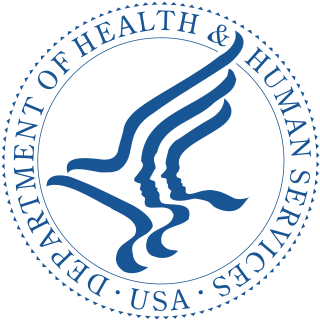Related Research Articles

In the United States, Medicaid is a government program that provides health insurance for adults and children with limited income and resources. The program is partially funded and primarily managed by state governments, which also have wide latitude in determining eligibility and benefits, but the federal government sets baseline standards for state Medicaid programs and provides a significant portion of their funding. States are not required to participate in the program, although all have since 1982.

The United States Department of Health and Human Services (HHS) is a cabinet-level executive branch department of the U.S. federal government created to protect the health of the U.S. people and providing essential human services. Its motto is "Improving the health, safety, and well-being of America". Before the separate federal Department of Education was created in 1979, it was called the Department of Health, Education, and Welfare (HEW).
Medicare is a federal health insurance program in the United States for people age 65 or older and younger people with disabilities, including those with end stage renal disease and amyotrophic lateral sclerosis. It started in 1965 under the Social Security Administration and is now administered by the Centers for Medicare and Medicaid Services (CMS).

The Centers for Medicare & Medicaid Services (CMS) is a federal agency within the United States Department of Health and Human Services (HHS) that administers the Medicare program and works in partnership with state governments to administer Medicaid, the Children's Health Insurance Program (CHIP), and health insurance portability standards. In addition to these programs, CMS has other responsibilities, including the administrative simplification standards from the Health Insurance Portability and Accountability Act of 1996 (HIPAA), quality standards in long-term care facilities through its survey and certification process, clinical laboratory quality standards under the Clinical Laboratory Improvement Amendments, and oversight of HealthCare.gov. CMS was previously known as the Health Care Financing Administration (HCFA) until 2001.

The Children's Health Insurance Program (CHIP) – formerly known as the State Children's Health Insurance Program (SCHIP) – is a program administered by the United States Department of Health and Human Services that provides matching funds to states for health insurance to families with children. The program was designed to cover uninsured children in families with incomes that are modest but too high to qualify for Medicaid. The program was passed into law as part of the Balanced Budget Act of 1997, and the statutory authority for CHIP is under title XXI of the Social Security Act.

The Indian Health Service (IHS) is an operating division (OPDIV) within the U.S. Department of Health and Human Services (HHS). IHS is responsible for providing direct medical and public health services to members of federally recognized Native American Tribes and Alaska Native people. IHS is the principal federal health care provider and health advocate for American Indian people.
The United States government provides funding to hospitals that treat indigent patients through the Disproportionate Share Hospital (DSH) programs, under which facilities are able to receive at least partial compensation.
The Oregon Health Plan is Oregon's state Medicaid program. It is overseen by the Oregon Health Authority.
Early and Periodic Screening, Diagnostic and Treatment (EPSDT) is the child health component of Medicaid. Federal statutes and regulations state that children under age 21 who are enrolled in Medicaid are entitled to EPSDT benefits and that States must cover a broad array of preventive and treatment services. Unlike private insurance, EPSDT is designed to address problems early, ameliorate conditions, and intervene as early as possible. For the 25 million children enrolled in Medicaid and entitled to EPSDT in 2012, the program is a vital source of coverage and a means to improve the health and well-being of beneficiaries.
In the United States, health insurance helps pay for medical expenses through privately purchased insurance, social insurance, or a social welfare program funded by the government. Synonyms for this usage include "health coverage", "health care coverage", and "health benefits". In a more technical sense, the term "health insurance" is used to describe any form of insurance providing protection against the costs of medical services. This usage includes both private insurance programs and social insurance programs such as Medicare, which pools resources and spreads the financial risk associated with major medical expenses across the entire population to protect everyone, as well as social welfare programs like Medicaid and the Children's Health Insurance Program, which both provide assistance to people who cannot afford health coverage.
Medicare Advantage is a type of health plan offered by private companies which was established by the Balanced Budget Act (BBA) in 1997. This created a private insurance option that wraps around traditional Medicare. Medicare Advantage plans may fill some coverage gaps and offer alternative coverage options in an attempt to make them appear more attractive to the subscriber as compared to traditional Medicare.
Healthcare reform in the United States has had a long history. Reforms have often been proposed but have rarely been accomplished. In 2010, landmark reform was passed through two federal statutes: the Patient Protection and Affordable Care Act (PPACA), signed March 23, 2010, and the Health Care and Education Reconciliation Act of 2010, which amended the PPACA and became law on March 30, 2010.
Medicaid estate recovery is a required process under United States federal law in which state governments adjust (settle) or recover the cost of care and services from the estates of those who received Medicaid benefits after they die. By law, states may not settle any payments until after the beneficiary's death. States are required to adjust or recover all costs under certain circumstances, all involving long-term care arrangements. Federal law also gives states the option to adjust or recover the costs of all payments to health care providers except Medicare cost-sharing for anyone on Medicaid over the age of 55.
The Empowering Patients First Act is legislation sponsored by Rep. Tom Price, first introduced as H.R. 3400 in the 111th Congress. The bill was initially intended to be a Republican alternative to the America's Affordable Health Choices Act of 2009, but has since been positioned as a potential replacement to the Patient Protection and Affordable Care Act (PPACA). The bill was introduced in the 112th Congress as H.R. 3000, and in the 113th Congress as H.R. 2300. As of October 2014, the bill has 58 cosponsors. An identical version of the bill has been introduced in the Senate by Senator John McCain as S. 1851.

The Affordable Care Act (ACA), formally known as the Patient Protection and Affordable Care Act (PPACA) and informally as Obamacare, is a landmark U.S. federal statute enacted by the 111th United States Congress and signed into law by President Barack Obama on March 23, 2010. Together with the Health Care and Education Reconciliation Act of 2010 amendment, it represents the U.S. healthcare system's most significant regulatory overhaul and expansion of coverage since the enactment of Medicare and Medicaid in 1965. Most of the act's provisions are still in effect.
The 340B Drug Pricing Program is a US federal government program created in 1992 that requires drug manufacturers to provide outpatient drugs to eligible health care organizations and covered entities at significantly reduced prices. The intent of the program is to allow covered entities to "stretch scarce federal resources as far as possible, reaching more eligible patients and providing more comprehensive services." Maintaining services and lowering medication costs for patients is consistent with the purpose of the program, which is named for the section authorizing it in the Public Health Service Act (PHSA) It was enacted by Congress as part of a larger bill signed into law by President George H. W. Bush.
The Affordable Care Act (ACA) is divided into 10 titles and contains provisions that became effective immediately, 90 days after enactment, and six months after enactment, as well as provisions phased in through to 2020. Below are some of the key provisions of the ACA. For simplicity, the amendments in the Health Care and Education Reconciliation Act of 2010 are integrated into this timeline.
A safety net hospital is a type of medical center in the United States that by legal obligation or mission provides healthcare for individuals regardless of their insurance status or ability to pay. This legal mandate forces safety net hospitals (SNHs) to serve all populations. Such hospitals typically serve a proportionately higher number of uninsured, Medicaid, Medicare, Children's Health Insurance Program (CHiP), low-income, and other vulnerable individuals than their "non-safety net hospital" counterpart. Safety net hospitals are not defined by their ownership terms; they can be either publicly or privately owned. The mission of safety net hospitals is rather to provide the best possible care for those who are barred from health care due to the various possible adverse circumstances. These circumstances mostly revolve around problems with financial payments, insurance plans, or health conditions. Safety net hospitals are known for maintaining an open-door policy for their services.
A portion of the taxes on legal cannabis sold since July, 2014 under Initiative 502 funds anti-cannabis public service announcements (PSAs) in Washington State.
References
- ↑ John Webster (July 23, 2013), "STATE TRIES TO SIMPLIFY MEDICAID Apple Health Program Aims to Reduce Sign-Up time, ER Trips", The Spokesman-Review , Spokane, WA
- ↑ DEPARTMENT OF SOCIAL AND HEALTH SERVICES LAUNCHES NEW APPLE HEALTH FOR KIDS - NEW INITIATIVE TO BOOST ENROLLMENT IN CHILDREN'S MEDICAL COVERAGE (press release), Washington State Department of Social and Health Services, March 10, 2009, archived from the original on November 21, 2018
- ↑ JoNel Aleccia (May 28, 2016), "Judge orders Washington Medicaid to provide lifesaving hepatitis C drugs for all", The Seattle Times
- ↑ "Estate recovery | Washington State Health Care Authority". Washington State Health Care Authority. Archived from the original on 2024-06-27. Retrieved 2025-01-19.